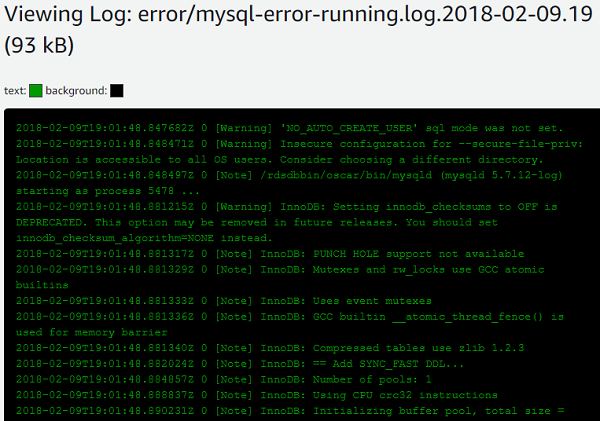Oracle alert log and MySQL error log
With Amazon DMS, you can capture and analyze Oracle alert log and MySQL error log during database migration tasks. The Oracle alert log records notifications and errors raised by the Oracle database, while the MySQL error log tracks errors, warnings, and notes generated by the MySQL server.
| Feature compatibility | Amazon SCT / Amazon DMS automation level | Amazon SCT action code index | Key differences |
|---|---|---|---|
|
|
N/A |
N/A |
Use Event Notifications Subscription with Amazon Simple Notification Service (SNS) |
Oracle usage
The primary Oracle error log file is the alert log. It contains verbose information about database activity including informational messages and errors. Each event includes a timestamp indicating when the event occurred. The alert log filename format is alert<sid>.log.
The alert log is the first place to look when troubleshooting or investigating errors, failures, and other messages indicating a potential database problem. Common events logged in the alert log include:
-
Database startup or shutdown.
-
Database redo log switch.
-
Database errors and warnings, which begin with
ORA-followed by an Oracle error number. -
Network and connection issues.
-
Links for a detailed trace files about specific database events.
The Oracle Alert Log can be found inside the database Automatic Diagnostics Repository (ADR), which is a hierarchical file-based repository for diagnostic information: $ADR_BASE/diag/rdbms/{DB-name}/{SID}/trace.
In addition, several other Oracle server components have unique log files such as the database listener and the Automatic Storage Manager (ASM).
Examples
The following screenshot displays partial contents of the Oracle database alert log file.

For more information, see Monitoring Errors and Alerts
MySQL usage
MySQL provides detailed logging and reporting of errors that occur during the database and connected sessions life cycle. In an Amazon Aurora deployment, these informational and error messages are accessible using the Amazon Relational Database Service console.
MySQL and Oracle error codes
| Oracle | MySQL |
|---|---|
|
ORA-00001: unique constraint |
Error [1062][23000]: Duplicate entry |
For more information, see Server Error Message Reference
Error log types
MySQL provides several types of logs.
| Log type | Information written to log |
|---|---|
|
Error log |
Problems encountered starting, running, or stopping mysqld. |
|
General query log |
Established client connections and statements received from clients. |
|
Binary log |
Statements that change data (also used for replication). |
|
Relay log |
Data changes received from a replication master server. |
|
Slow query log |
Queries that took more than |
|
DDL log (metadata log) |
Meta-data operations performed by DDL statements. |
For more information, see MySQL Server Logs
Examples
Access the MySQL error log using the Amazon Relational Database Service or Amazon Aurora console:
-
Sign in to the Amazon Management Console, choose RDS, and then choose Databases.
-
Choose the instance name.
-
Choose Logs & events and select the log to inspect. For example, select the log during the hour the data was experiencing problems. The following screenshot displays partial contents of a MySQL database error log as viewed from the Amazon Relational Database Service console.

MySQL error log configuration
Several parameters specify the location of the MySQL log and errors files. The following table identifies common Amazon Aurora configuration options.
| Parameter | Description |
|---|---|
|
|
Sets the file name and path for the error log. You can modify it through an Aurora Database Parameter Group. |
|
|
Sets the message levels that are logged such as error, warning, note messages, and so on. You can modify it through an Aurora Database Parameter Group. |
|
|
Sets the minimum execution time above which statements are logged in ms. You can modify it through an Aurora Database Parameter Group. |
Note
Modifications of certain parameters, such as log_error are turned off for Aurora MySQL instances.
